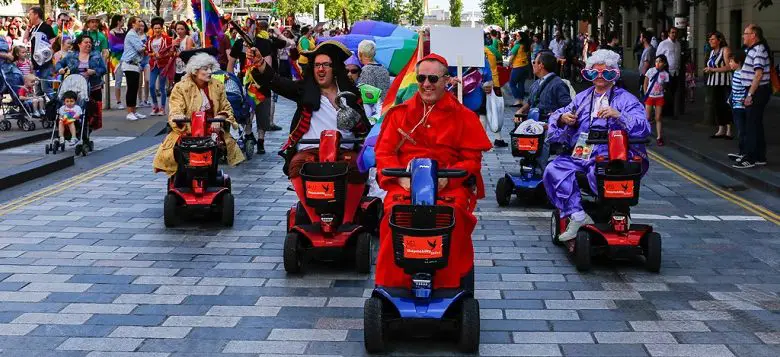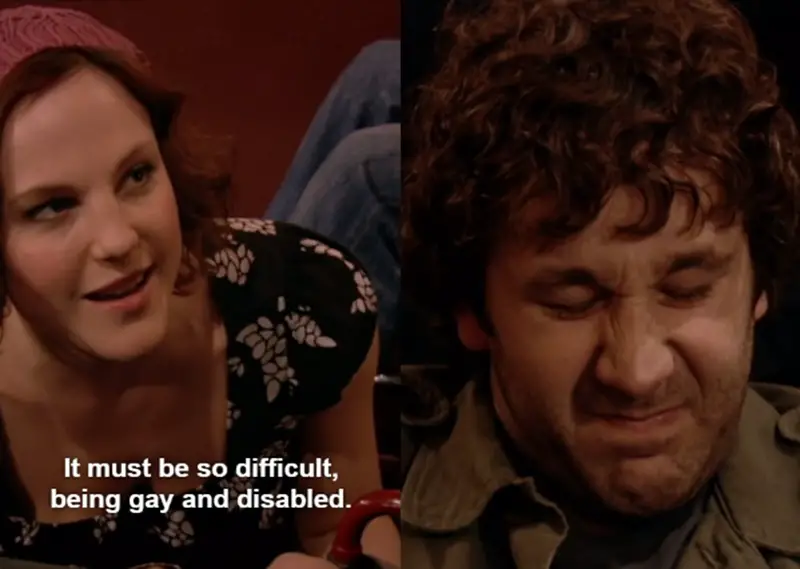
Gay and disabled: I’m proud of who I am
It’s just under one week until one of the main events myself and my friends always go to kicks off – Manchester’s Big Weekend, otherwise known as Gay Pride. I’ve identified openly as a lesbian for a few years now, and have encountered very few negative responses.
I’ve also been registered as a disabled person my entire life, but people’s response to this are often entirely different and rarely positive. More often than not, if I mention being disabled in conversation with new groups of people, it creates an awkward atmosphere. I’ve even had people respond with; “No need to get so depressing.” I’m sorry, I wasn’t aware that how I was born was so bad.
I’m twenty-one years old and I was born with Spina Bifida Occulta, Short Bowel Syndrome and developed scoliosis as an adolescent. I grew up in and out of three children’s hospitals and am now a patient at three adult ones. I have lost count of how many volumes of hospital notes I have to my name.
But my impairments are not instantly noticeable, and because of this, my disabilities do not seem to be what people visualise when they think ‘disabled’. The same goes for my sexual orientation, people are often surprised to hear about the two together.
When I come out as gay, a number of people said to me; “no you’re not,” followed by intrusive questioning. This was particularly common if I was with a large group of men.
Being hit with the unwanted quizzing is annoying, but worse than that, I consider it a form of homophobia – it suggests a lack of respect for someone’s personal sexuality. However, it is not as annoying as being accused of putting a downer on a conversation simply because you’re disabled.
My whole life I have had a navigate through an able-bodied society, all whilst learning to cope with medication and surgery as part of my everyday life. Both myself and my older sister were turned away from the local primary school for being disabled. Thankfully I was able to find a very supportive school eventually, although my sister’s experience was less positive then mine.
It first hit me that my impairments made me ‘other’ on my first day of high school. I was bullied for walking slowly, for carrying a backrest and for using disabled facilities. Students would mock each other with ableist slurs mimicking disability gestures.
Suddenly, my everyday life served as an everyday reminder of why I had been diagnosed at birth as ‘wrong’. I was even asked to cover my leg brace for a school photograph. The photographer came towards me and tried to pull my legwarmers over my brace without asking. She huffed when she was unable to do so.
Homophobic slurs and discrimination were also prominent in my high school, but the difference was that whilst I was struggling with my sexuality, I was aware of support websites and gay pride events. I knew that there were gay people in loving relationships, and that away from the high school environment, being gay was something that could be celebrated.
But I had never heard of people being happy with, proud of or celebrating being disabled. Being disabled was presented as something to fear – “If you do this, you might end up becoming disabled.” The disabled community was the one no-one wanted to become a part of, because being disabled means that something doesn’t work properly.
You’re disabled so you ‘can’t’ do this and you ‘can’t’ do that. You’re disabled so you’re a burden to society. You require all these support systems and you don’t do anything for yourself.
Thankfully this attitude seems to be changing slightly now, but growing up, all the disability-related articles I read focused on what disabled people lack and what they need help with. It was all very grim.
To grow up with who I am being constantly associated with everything that people want to avoid, lead to around a decade of clinical psychology and self-hate, that I have only recently pulled myself out of.
Disabled people can’t do some things that well or without help, but they can do other things incredibly, the same as everybody else, if not better. I am fed up with being told to dissociate myself from what has actually been a very important and positive part of my life experience – I have learnt so much as a result of being disabled.
I want to be able to celebrate being part of the disabled community with as much openness and fun as I am now able to celebrate being part of the gay community. I don’t want to be told that who I am is depressing because I know for a fact that I am not a depressing person. I am positive and optimistic, and I owe a lot of that to discovering the overwhelming diversity and strength that is present within the disabled community. I wouldn’t wish to be born any other way. I am proud to be disabled.
By Julia Blackwell
Check out…
